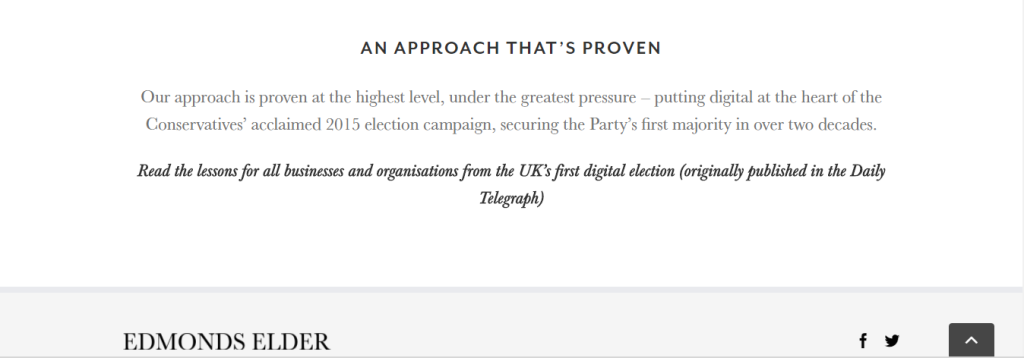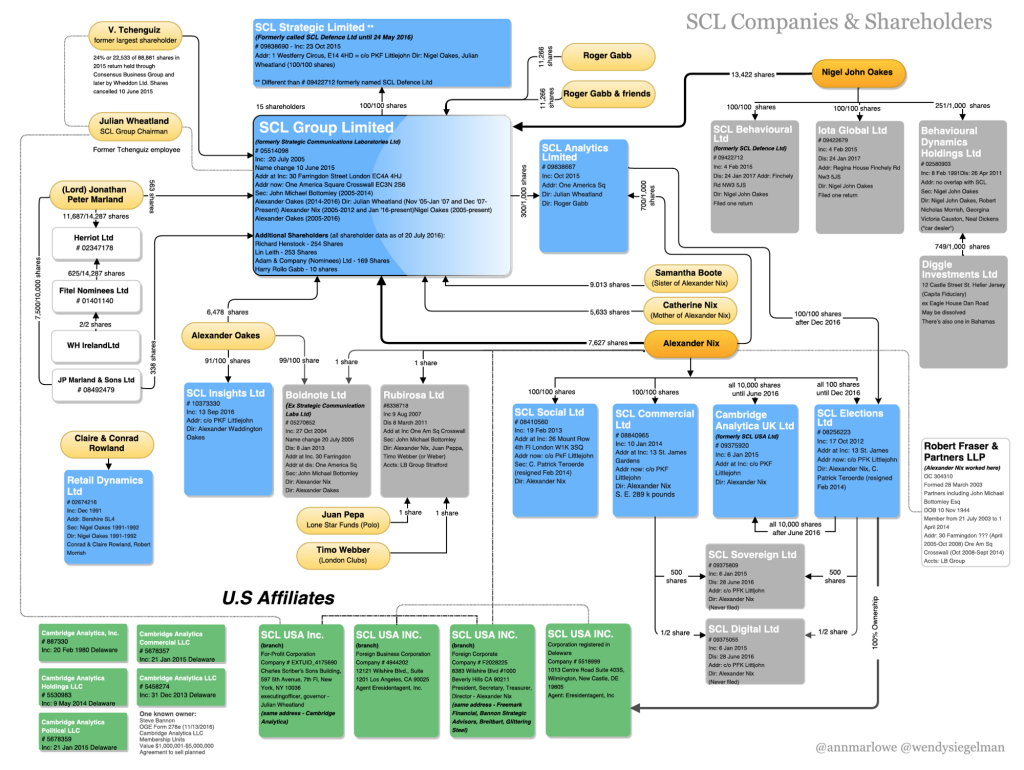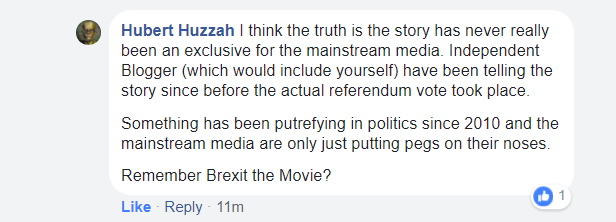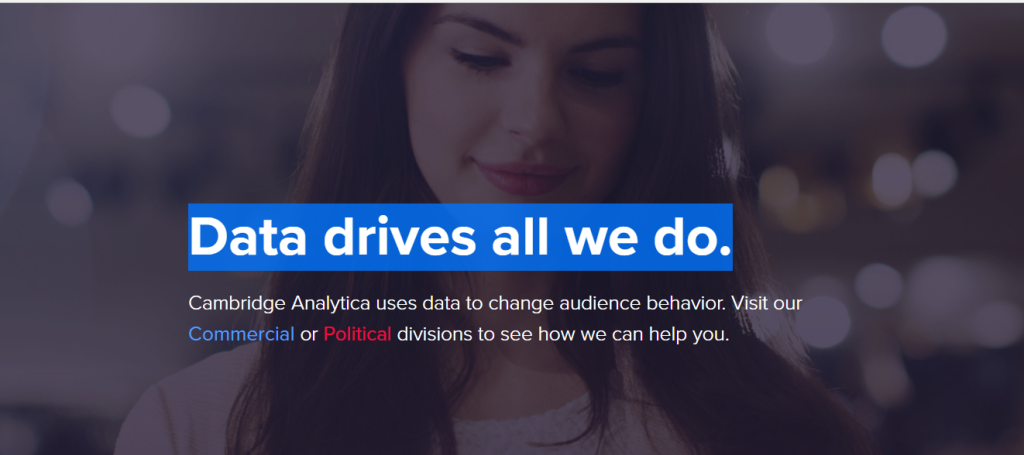Media Intelligence Partners’ lobbying aims.
Dark arts.” “Peddling.” “Salacious.” These are just a handful of terms the media has used to describe campaign, ‘corporate research’ and ‘strategic communications’. Even the lighter description “opposition” doesn’t quite capture what companies like Cambridge Analytica do.
The Cambridge Analytica scandal has highlighted that the power and dominance of the Silicon Valley – Google and Facebook and a handful of very wealthy individuals – are at the centre of the global tectonic shift we are currently witnessing, as democracies are increasingly being stage-managed by those who can afford the props and scripts. In a way, it was inevitable that sooner or later, politics would be reduced to branding and ‘market competition’, and that political outcomes would become aligned with neoliberal outcomes.
Surveillance strategies and targeted marketing also include the use of biometrics. The private company Endless gain, for example, use biometrics and psychology and “to understand human emotions and behaviour, and Psychology to optimise human emotions and behaviour. Our way helps our clients convert more customers, keep them for longer, and have them spend more.”
Endless Gain claim on their site to “optimise conversions” in the same way that behavioural economists at the Nudge Unit claim to “optimise decision-making”, in their quest to align citizens’ choices with neoliberal outcomes.
The company uses eyetracking, facial expression recognition, galvanic skin response, EEG and pupil dilation – biometrics, in addition to conventional psychological research, “bringing together biometric research with findings from decades of academic psychology –particularly on emotional decision-making and the psychology of persuasion – to make changes to your site that increase both revenue and conversions.”
Other companies, such as the hugely influential Crimson Hexagon, use AI. The company is based in Boston, Massachusetts and has also a European division in London. Edelman Intelligence, a massive PR company, are a client of this company, as are Twitter. The company’s online data library consists of over 1 trillion posts, and includes documents from social networks such as Twitter and Facebook as well as blogs, forums, and news sites. The company’s ForSight platform is a Twitter Certified Product. (See also: The anti-social public relations of the PR industry, which details the intrusive ‘360 degree’ social media ‘listening’ and monitoring posts used by companies to gather data and intelligence and to formulate ‘strategic communications’ to discredit critics)
This level of surveillance and persuasion is deeply intrusive form of commodification and control that effectively exiles citizens from their own characteristics, perceptions, behaviours and choices, while producing lucrative markets aimed at data mining, behavioural analysis, prediction and modification.
Furthermore, the data collection, analysis and profiling is likely to build in discrimination, reflecting and reinforcing material and power inequalities. Credit reference agencies, insurance companies and the financial sector have previously demonstrated this point only too well.
The data mining, analytics and persuasion market exists because large corporations and governments want to micromanage and psychoregulate citizens. However, such intrusive surveillance and micromanagement poses fundamental challenges to our democratic norms and personal autonomy.
Tailored and targeted ‘strategic communications’ and persuasions are based on behaviour modelling and presupposed preferences, which may or may not be accurate or comprehensive. However, such an approach forecloses the possibility of citizens seeing alternative choices and developing new preferences: of accessing a full range of choices, learning and developing. It reduces citizens, commodifying their biology, psychology and decision-making, and transforming human nature into profits for big businesses and maintaining the power of the establishment.
Carole Cadwalladr, writing for the Guardian and Observer, revealed how the foundations of an authoritarian surveillance state have been laid in the US and how British democracy was subverted through a covert, far-reaching plan of coordination enabled by a US billionaire, Robert Mercer. And how we are in the midst of a massive land and power grab by billionaires via our data. Data which is being silently amassed, harvested, analysed, profiled and stored. Whoever owns this data owns the future.
The Cambridge Analytica scandal highlights the erosion of democracy because governments are paying to use these sophisticated techniques of persuasion to unduly influence voters and to maintain a hegemony, amplifying and normalising dominant political narratives that justify neoliberal policies. ‘Behavioural science’ is used on every level of our society, from many policy programmes – it’s become embedded in our institutions – to forms of “expertise”, and through the state’s influence on the mass media, and other social and cultural systems.
It also operates at a subliminal level: it’s embedded in the very language that is being used in political narratives. Repetition is an old propaganda technique that sometimes works. The ‘Strong and Stable’ ideological motif of the government, however, was a tad overused, and led to ridicule because it became so visible as a ill-conceived technique of persuasion. But what about all of the psycholinguistic cues that remain opaque?
The debate should not be about whether or not these methods of citizen ‘conversion’ are wholly effective, because that distracts us from the corrupt intentions behind the use of them, and especially, the implications for citizen autonomy, civil rights and democracy.
Whistleblower Christopher Wylie has said that British voters in the lead up to the referendum to exit the European Union were duped by the Leave campaign. Speaking to MPs on Tuesday 27 March, the former Cambridge Analytica employee described how pro-Brexit groups like BeLeave used Canadian firm Aggregate IQ (AIQ) to profile and target online voters with psychologically tailored “strategic communications”, using personal data allegedly gleaned from Facebook.
“I think it is completely reasonable to say that there could have been a different outcome of the referendum had there not been, in my view, cheating,” he said. The revelations and accusations came almost exactly one year before the UK leaves the EU on 29 March, 2019.
Wylie said AIQ was subcontracted through Cambridge Analytica, a political data company which also stands accused of manipulating voter behaviour to help Donald Trump win the US presidential election. The comments follow separate accusations that the Leave campaign may have also broken electoral laws on spending thresholds, which are capped at £7m. The Leave campaign spent £6.77m but then allegedly received a £625,000 donation from BeLeave, a youth Brexit group. The donation was then spent on AIQ services, in breach of the £7m limit on campaign spending. Wylie also described the spending breach as part of a “common plan” coordinated by the pro-Brexit campaign.
Cambridge Analytica is by no means the only private company that has hugely profited from corrupt methodologies, abominable politicking and the run-up to Brexit. The company is a pioneer in ‘behavioural microtargeting’ – using online data to build up a sophisticated psychological profile of voters, then targeting those individuals with ‘bespoke’ psychologically tailored messages, and the media, with carefully curated narratives that indulge group tendencies – drawn from social psychology and in-depth knowledge of social science – and social norms to influence political outcomes.
The UK Policy Group
There are many other similar companies which are quietly raising substantial antitrust concerns.
The UK Policy Group, for example, is the UK branch of a notorious US political organisation – Definers Public Affairs – which has worked for Donald Trump’s administration and has aggressively targeted his critics. The company boasts: “What sets us apart is our focus on political-style research, war room media monitoring, political due diligence and rapid response communications.
“We help our clients navigate public affairs challenges, influence media narratives and make informed decisions to disrupt crowded markets.
“The global political, policy and corporate communications landscapes are evolving rapidly. Decision makers need high quality research to make informed decisions and need relevant content to drive the court of public opinion and provide context to shape decisions by policymakers.
“With affiliates in Washington, D.C., and Silicon Valley, UK Policy Group employs some of the best communicators, researchers and media analysts as part of our team.”
Former government officials are advising this highly controversial company. The UK company’s vice president is Andrew Goodfellow, who was the Conservative Party’s director of policy and research.
Ameet Gill, who was the former director of strategy Number 10 and founder of lobbying company Hanbury Strategy, is providing consultancy to the firm. Official documents reveal that David Cameron ’s former director of strategy, Gill, was given permission by parliamentary authorities to accept a contract advising the firm through his political strategy company Hanbury Strategy. Pelham Groom, a company director, was previously head of ‘media monitoring’ for the Conservative Party. Chris Brannigan, Theresa May’s former Director of Government Relations is also a member of the group’s advisory board. Rhiannon Glover is an analyst, formerly, the late duty press officer for the Conservative Party and researcher in the office of Nick Hurd.
The company is also partnered with Trygve Olson, of Viking Strategies, who advised the European People’s Party in the 2009 EU elections and worked as a consultant to the Republican Party in the US.
The company says: “We offer our clients an end-to-end system of research on issues and opponents, monitoring the news cycles, and shaping narratives via rapid rebuttal communications.
UKPG provides our clients with unparalleled campaign-style research as the foundation of driving informed decisions that allow them to shape public opinion, and impact outcomes.”
The company employs people to find damaging information on political rivals. Scrutinising the personal histories, online videos and posts of Labour Party candidates, the company collects dossiers of potential discrediting and smear material to be handed to the Conservative Party. It’s understood that the information is then handed to right-wing websites and newspapers to construct narratives and add a veneer of evidence to negative articles.
The company expansion by US-based company Definers Public Affairs came at a time when US lobbying firms were eyeing UK expansion “in anticipation of flood of Brexit-related work, using their capacity to influence the national news cycle’ and as a ‘master of opposition research”.
Ian Lavery MP, Labour Party Chair, said: “I am disappointed but not surprised to hear that in an attempt to deflect from their total lack of direction and policy, the Tories are reduced to digging low and dragging British politics through the gutter, in the desperate hope that they may find some salacious morsel.
“This kind of base mudslinging has no place in British democratic debate, and deflects from the real issues facing people today. It is time that Theresa May stops spending money and effort on these tactics and focuses on policies to improve the lives of those who have suffered because of her government’s heartless policies.”
Brexit
There is a clear danger that the UK, having “taken back control” will simply hand enormous power over to corporate lobbyists who see Brexit as “a once-in-a-lifetime” opportunity to influence the way the UK is governed. Those companies that can influence policies and regulations – such as trade policies, labour laws and environmental regulations – stand to profit hugely.
For those who are worried they won’t, well there are a huge number of think tanks, consultancies and PR companies ready to lobby on their behalf and guide them through the Brexit fallout, all for a hefty sum of post-Brexit private profits.
In the wake of the EU referendum, many law firms have also created stand alone ‘Brexit’ teams in order to cope with the increasing demand from clients asking how leaving the EU will impact them. Just after the referendum, companies are bringing together existing partners to build out their Brexit teams, mainly composed of individuals with EU/competition, trade and regulatory backgrounds.
Former government lawyers can earn significantly more money in the private sector. In return, law firms get people with not just the relevant legal skills, but also insider knowledge and connections: people with “a unique understanding of the administrative and political processes across Westminster, Whitehall and Brussels”.
Law firms are hiring politicians, government lawyers and other officials in a bid to position themselves as the go-to people for such advice.
Some of the notable recent moves of government ministers through the revolving door to private profiteering, are:
Paul Hardy, House of Lords → DLA Piper Senior Director Competition law, International Trade
Andrew Hood, Foreign and Commonwealth Office → Dechert Senior Director International Trade, Government Regulation
Francis Maude, Government → Covington & Burling Senior Advisor International Trade, Regulation
Anthony Parry, HM Treasury → Freshfields Bruckhaus Deringer Consultant EU Law, International Trade.
Here is a list of ‘go-to’ private companies that are profiting from handing out Brexit advice and lobbying on behalf of big business:
- Douglas Alexander
- Boscobel & Partners
- Competere Group
- Covington & Burling LLP
- Tomos Davies
- Dechert
- Definers Public Affairs
- Dentons
- DLA Piper
- Freshfields Bruckhaus Deringer
- Gibson, Dunn & Crutcher
- GK Strategy
- Hanbury Strategy
- Hanover Communications
- Herbert Smith Freehills
- Hume Brophy
- Interel Consulting UK
- Media Intelligence Partners
- Newgate Communications
- Pagefield
- Pinsent Masons
- Portland PR
- Squire Patton Boggs
- Teneo Blue Rubicon
- UK Policy Group
See also Brexit – lobbyists-for-hire.
Media Intelligence Partners
Conservative hack Nick Wood, who was once Iain Duncan Smith’s former press aide, set up his own PR consultancy, Media Intelligence Partners in 2004. From 1998 until 2004 he was the Media director for Conservative Party.
However, a break from the Conservatives was absolutely not on the cards for this die-hard Thatcherite. Wood, axed by Michael Howard in 2004, went on to represent Iain Duncan Smith’s think-tank and advised selected Tory parliamentary candidates on PR in the run-up to subsesquent election in 2005.
Wood, who held senior political roles at The Times and Daily Express during a 20-year journalistic career, served under both Iain Duncan Smith and William Hague during one of the most internecine periods in Tory history.
He has worked with around 50 clients including “prestigious” international think- tanks like the Heritage Foundation and some of the “thought-leaders in UK public policy,” such as the Centre for Social Justice. MIP worked with pro-Brexit Leave means Leave and Economists for Free Trade, formerly called Economists for Brexit. This group has a powerful influence on the media.
Advisors for Economists for Free Trade include Tim Montgomerie, Jacob Rees-Mogg, Owen Paterson, Viscount Ridley and John Longworth, Former Director British Chambers of Commerce, Co-Chairman of Leave Means Leave.
Wood has also worked with major private sector clients including HSBC Bank and eBay. In 2008 he also established the media training and presentation company Pitch-Perfect with Jonathan Haslam, a former Downing Street Press Secretary.
Media Intelligence Partners (MIP, sometimes MIPPR)) is a London-based PR and lobbying company. The Telegraph reported in 2009 that four Conservative MPs had claimed more than £66,000 in expenses for services provided by the company. Commons rules state that “advice for individual members on self-promotion or PR for individuals or political parties” is banned. However, that didn’t stop Iain Duncan Smith claiming more than £11,000 on his office expense account for services between June 2005 and December 2007.
Andrew Mitchell, the shadow international development secretary, billed the taxpayer for £18,800 for “research and secretarial services” between April 2006 and July 2008.
Nadine Dorries, the Conservative MP for Mid-Bedfordshire, claimed almost £20,000 in office expenses for “research” from the consultancy between November 2006 and May last year, while Philip Dunne, another backbencher, claimed for £17,000 for “research and secretarial services”.
MIP provides services to a number of Brexit lobby groups. As well as being heavily involved in the campaign leading up to the referendum, and Brexit campaigns since, MIP also sells consultancy services to clients.
It says of its ‘Brexit Consultancy’: “MIP is ideally placed to help business leaders navigate this challenging period of change. We help our clients reduce risk and grasp the opportunities of the UK’s exit from the EU. Our insight and expertise on the negotiations and the likely outcomes are invaluable to business leaders in all sectors.”
The company says that during the EU referendum campaign, it “worked closely with current and former cabinet ministers”, including the Secretary of State for Exiting the EU, David Davis, and International Trade Secretary, Liam Fox. It says it ‘remains at the forefront of the campaign to secure the best possible deal for Britain.”
MIP were behind the launch Conservatives for Britain, the organisation that lead the Conservative campaign to leave the European Union. The launch appeared in the Sunday Telegraph on 7 June 2015. Conservatives for Britain was founded by MP Steve Baker and MEP David Campbell Bannerman and went on to attract the support of over 100 Conservative Party MPs.
Grassroots Out
MIP ran the ‘communications and strategy’ campaign forGrassroots Out in the four months prior to the June 2016 referendum. Four senior MIP employees were seconded to the campaign, directing the press office and providing ‘high-level strategic advice’ to the campaign’s key spokespeople. MIP also managed a nationwide Grassroots Out tour, featuring speeches from Chris Grayling, Owen Paterson and Liam Fox. Founded by Conservative MPs Peter Bone, Tom Pursglove and the Labour MP Kate Hoey, Grassroots Out claimed cross-party support, including from MIP, the Brexit Secretary David Davis and Nigel Farage, the ex-leader of UKIP.
Leave Means Leave
Since the EU referendum, MIP has been working with Leave Means Leave “to make sure the instructions of the British people are acted upon”. This has involved MIP communicating with ministers on Leave Means Leave‘s behalf.
MIP undertaking media work for the launch of a joint Centre for Social Justice and Legatum Institute report called 48:52 Healing a Divided Britain in September 2016.
The MIP site says: “We devise effective and strategic media outreach, implementing bespoke public relations campaigns. We help our clients achieve their goals across both traditional platforms and more modern online and social media.
“We have unrivalled experience of the media landscape, from Fleet Street to broadcasters and online media. Our staff have worked at the highest levels of national newspapers and international broadcast organisations and have in-depth knowledge of the media’s editorial processes.”
Wood set up MIP with then former Central Office staffer Penny Mordaunt and Nick Longworth, the broadcast PR specialist also axed in the PR Officers’ cull that ended Wood’s five-plus years running Tory media operations.
Edgar Johnson is a Senior Account Executive at MIP and works on a variety projects ranging from new product and company launches to “bespoke political campaigns.” He also assists with MIP’s digital communications and research services.
Prior to joining MIP, Johnson worked as a researcher for Mark Harper MP in the UK Parliament.
He has “valuable campaigning experience from the 2015 General Election where he wrote election literature, devised social media content and campaigned on the front line across several key marginal seats. This helped to return a full brace of Conservative MPs across his region for the first time in nearly 30 years.”
He was also part of MIP’s team providing communications and strategy for the cross-party Grassroots Out campaign during the 2016 EU referendum. During the campaign, he co-ordinated successful events across the country and managed one of Grassroots Out’s largest rallies featuring current Secretary of State for International Trade, Rt. Hon Liam Fox MP. MIP were paid a total of £42,828.00 for their services.
Brexit Consultancy: the result of years of lobbying for vested interests
MIP say: “The United Kingdom’s historic decision to leave the European Union represents a period of uncertainty and opportunity for Britain’s business community. The consequences for legislation, regulation, tariffs and trade rules are huge – and will affect UK firms operating domestically and internationally.
“MIP is ideally placed to help business leaders navigate this challenging period of change. We help our clients reduce risk and grasp the opportunities of the UK’s exit from the EU. Our insight and expertise on the negotiations and the likely outcomes are invaluable to business leaders in all sectors.
“Our Brexit advisory service is headed up by our Chief Executive, Nick Wood. Before founding MIP in 2004, Nick served as Director of Communications to the Conservative Party, having previously been Chief Political Correspondent for The Times newspaper.
“Nick and our MIP staff were at the heart of a Leave campaign that upset the odds, winning the support of 17.4 million people in the largest democratic exercise in the nation’s history.
“We worked with politicians from across the political spectrum, as well as senior business people and campaigning organisations, to bring about the referendum over a number of years. We then worked intensively for four months of the campaign itself to win a historic victory.
“During this time, we advised and worked closely with current and former cabinet ministers, including the Secretary of State for Exiting the EU, David Davis, and International Trade Secretary, Liam Fox. We remain at the forefront of the campaign to secure the best possible deal for Britain.” (My emphasis)
It then says: “To learn more about how we can help your business capitalise on the opportunities of Brexit, please get in touch.”
In February 2017, the Electoral Commission launched an investigation into referendum spending by Vote Leave and Britain Stronger in Europe. Taking a lead from a series of articles, particularly by Carole Cadwalladr in the Observer, the Commission began looking at the role of AggregateIQ in the referendum campaign.
The Electoral Commission wrote to Darren Grimes, this time asking him to “please explain why you chose to commission AggregateIQ in particular to undertake the work you reported in your spending return, rather than another company.”
Replying on March 3, Grimes told the Electoral Commission that he decided to spend more than £675,000 with AggregateIQ after volunteering with Vote Leave and watching the US presidential election process. “I attended some Vote Leave Ltd events during the campaign as a volunteer activist and socialised with some members of staff. I asked and was told that AIQ was running Vote Leave’s digital campaign and I also became aware that AIQ had worked on Ted Cruz’s presidential campaign, that I was greatly impressed by. I was therefore confident that they could assist us in putting the proposed donation to effect in the time available,” Grimes said in emails to the Electoral Commission.
On 11 May 2018, the Electoral Commission found against Leave.EU, which ran a separate campaign to the official pro-Brexit group Vote Leave, following its investigations into alleged irregularities during the referendum campaign. It found that Leave.EU had unlawfully overspent at least £77,380 – 10% more than the statutory spending limit – though the real figure “may well have been considerably higher”.
Additionally, its investigations found that Leave.EU inaccurately reported three loans it had received, including “a lack of transparency and incorrect reporting around who provided the loans, the dates the loans were entered into, the repayment date and the interest rate.” Finally, Leave.EU had also failed to provide the required invoice or receipt for “97 payments of over £200, totalling £80,224.”
The Electoral Commission’s director of political finance and regulation and legal counsel complained that the £70,000 fine he was permitted to impose on Leave.EU did not meet the severity of the offences committed by a “key player in the EU referendum”. Further he announced that there was ample evidence of criminal activity from the group campaign chief, Liz Bilney, and that she “knowingly or recklessly signed a false declaration accompanying the Leave.EU referendum spending return”. The Electoral Commission has referred the matter to the police.
Leave.EU’s co-founder, Aaron Banks, has stated that he rejects the outcome of the investigation and will be challenging it in court.
In January 2018, the UK government’s own Brexit analysis was leaked; it showed that UK economic growth would be stunted by 2%-8% for at least 15 years following secession from the EU, depending on the leave scenario.
The UK continues to learn the hard way that democracy and journalism is in danger of being overwhelmed by rogue politics and a communications industry revolution that accelerates the spread of pro-establishment lies, misinformation and dubious claims, commonly called ‘briefings’.
Many observers point to the two major events – Brexit and the election of Donald Trump – that signal moments of peril for democracy and the press. Both of these events are linked by a handful of people – Steve Bannon and Robert Mercer, for example.
The lobbying industry shapes policies that suit big business and a minority of the population. PR and communications companies are often involved in the circulation of malicious, pro-Conservative ‘strategic communications’ on behalf of those powerful and wealthy enough to benefit from spending hundreds of thousands of pounds on private companies every time there is an election or referendum, the resilience of populist propaganda, racism and sexism and the emergence of the so-called post-truth era erodes the fundamental foundations of democracy and corrupts what was once the cornerstone of ethical journalism.

Conservative donor Robert Mercer invested $15 million in Cambridge Analytica, where his daughter Rebekah is a board member. Credit Patrick McMullan, via Getty Images.
Related
Conservatives for hire: cashing in on Brexit
I don’t make any money from my work. But you can help by making a donation to help me continue to research and write informative, insightful and independent articles, and to provide support to others. The smallest amount is much appreciated – thank you.




















